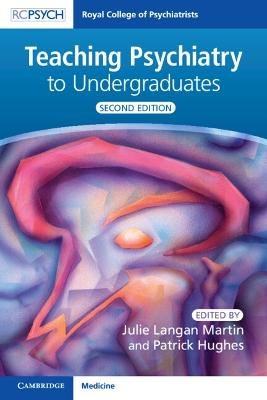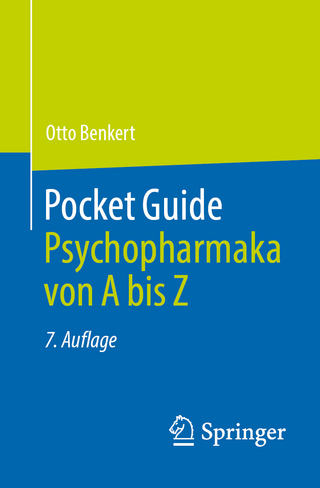
Teaching Psychiatry to Undergraduates
Cambridge University Press (Verlag)
978-1-108-92597-6 (ISBN)
Psychiatry requires a unique blend of knowledge, skills and attitudes, with important ethical and philosophical issues intrinsic to the specialty. Although teaching is an important part of training and working as a psychiatrist, this is often carried out without any specific training in educational theory or practice. This book teaches readers how to apply educational theory in this complex setting to provide the best possible learning experience for students. Chapters are short and focused, allowing the busy psychiatrist or other professional involved in undergraduate psychiatry teaching to pick it up, absorb some of the principles, and start applying them straight away to improve their teaching. Contributions from individuals with lived experience throughout the book provide insight into the patient experience and how this can be sensitively and effectively incorporated into undergraduate teaching and the benefits that can be gained from doing so.
Patrick Hughes is a Consultant Psychiatrist at NHS Forth Valley, Scotland, UK. As well as working as a clinical teaching fellow and completing a postgraduate certificate in medical education, he has previously spent two years working full-time as an English teacher in Seville. During his psychiatric training, he developed sessions to expand the psychiatric clinical skills teaching available. Julie Langan Martin is an Honorary Consultant Psychiatrist and Senior Clinical Lecturer in Psychiatry at the University of Glasgow, Scotland, UK. She teaches on the undergraduate medical curriculum, is Post Graduate Teaching (PGT) Convenor within the Institute of Health and Wellbeing, and Programme Director of the on-campus and online distance learning masters in Global Mental Health. She completed a clinical research training fellowship alongside a Master of Education in 2016.
1.1. The teacher Dr Patrick Hughes; 1.2. The curriculum Dr Julie Langan Martin; 1.3. Knowledge, skills and attitudes Professor Faith Hill; 1.4. The learner Professor Faith Hill; 2.1. Understanding curriculum design Dr Kenneth Ruddock and Dr Robert Clafferty; 2.2. Preclinical versus clinical years Dr Neelom Sharma; 2.3. Patients as educators in psychiatry: the ethical and educational case Simon Rose, Alexa Sidwell and Professor Subdoh Dave; 2.4. Assessment of undergraduates in psychiatry Professor Brian Lunn; 2.5. Beyond the undergraduate core curriculum Dr Julie Langan Martin and Dr Daniel Martin; 2.6. Supporting the psychiatrists of tomorrow Zoé Mulliez; 3.1. Clinical placements: Organisation and supervision Dr Rekha Hegde; 3.2. Teaching and learning in clinical settings Dr Amy Manley; 4.1. How to give a lecture Professor Nisha Dogra and Dr Sophie Butler; 4.2. How to do small group teaching Professor Nisha Dogra and Dr Khalid Karim; 4.3. Case based learning Dr Seri Abraham, Professor Subodh Dave, and Dr Mike Akroyd ; 4.4. Role play and experiential learning Professor Subodh Dave, Dr Seri Abraham and Dr Mike Akroyd; 4.5. Simulation Dr Mike Akroyd, Professor Subodh Dave and Dr Seri Abraham; 4.6. Balint groups for medical students Dr Angeliki Zoumpouli and Dr Barbara Wood; 4.7. Teaching the mental state examination: An example of multimodal teaching Dr Patrick Hughes; 5.1. Online learning Professor Jo-Anne Murray; 5.2. The flipped classroom Laura McNaughton and Neeraj Bhardwaj; 5.3. Use of technology and social media Dr Derek K. Tracy, Patricia Vinchenzo and Nikki Nabavi; 6.1. Quality in medical education Dr Genevieve Holt and Dr Miranda Kronfli; 6.2. Quality in practice Dr Genevieve Holt and Dr Miranda Kronfli; 6.3. Gathering feedback Dr Laura Sharp, Dr Dimitar Karadzhov and Dr Helena Paterson; 7.1. The student in difficulty Dr Angela Cogan; 7.2. What do I do? Dr Angela Cogan; 7.3. Raising awareness and promoting well-being Dr Ahmed Hankir, Katharine Huggins and Dr Rashid Zaman; 8.1. Getting involved Dr Neera Gajree; 8.2. Formal roles in medical education Dr Wai Lan Imrie; 8.3. Training in medical education Dr Amy Manley.
| Erscheinungsdatum | 12.10.2022 |
|---|---|
| Zusatzinfo | Worked examples or Exercises |
| Verlagsort | Cambridge |
| Sprache | englisch |
| Maße | 156 x 233 mm |
| Gewicht | 360 g |
| Themenwelt | Geisteswissenschaften ► Psychologie ► Klinische Psychologie |
| Medizin / Pharmazie ► Medizinische Fachgebiete ► Psychiatrie / Psychotherapie | |
| Sozialwissenschaften ► Pädagogik ► Berufspädagogik | |
| ISBN-10 | 1-108-92597-9 / 1108925979 |
| ISBN-13 | 978-1-108-92597-6 / 9781108925976 |
| Zustand | Neuware |
| Informationen gemäß Produktsicherheitsverordnung (GPSR) | |
| Haben Sie eine Frage zum Produkt? |
aus dem Bereich


